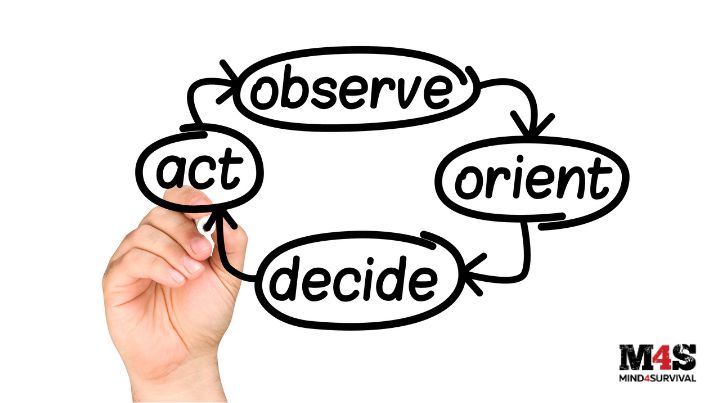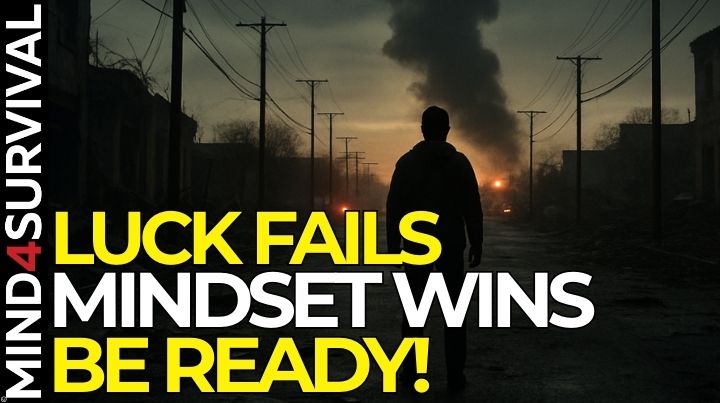Situational Awareness: Staying Alert and Staying Safe
Situational awareness is the foundation of personal safety and preparedness. It involves recognizing and understanding what is happening around you to identify potential threats and opportunities and respond accordingly. This skill is essential for everyone, from the military and law enforcement to women nervously walking alone through a parking lot at night.
Understanding Situational Awareness
Situational awareness begins with observation. It's the process of actively scanning your surroundings, noting what is usual, and identifying what seems out of place. This continuous awareness allows you to detect anomalies that could indicate danger. For example, a person loitering near your home, an unattended bag in a crowded place, or the uneasy feeling you have in the pit of your stomach might signal a potential threat.
The key to situational awareness is to remain vigilant and ready to act if necessary. That does not mean being paranoid. It also means paying attention to the world around you and noting when something seems off.

The OODA Loop
The OODA loop—Observe, Orient, Decide, Act—is a decision-making model that military strategist John Boyd developed. This loop helps individuals process information quickly and respond effectively:
- You observe your environment.
- You orient yourself by interpreting the observations based on your knowledge, experiences, and biases.
- You decide on a course of action.
- You act on your decision.
By constantly cycling through these steps, you can stay ahead of potential threats and effectively respond before they impact you.
Practicing Situational Awareness
Practicing situational awareness is vital for enhancing personal safety, improving emergency response times, preventing accidents, and making informed decisions. Likewise, while practicing situational awareness helps us overcome threats, it also helps us recognize opportunities and seize the day.
Practicing situational awareness boosts confidence, helps protect loved ones, deters crime, and reduces stress by giving a sense of control over one's environment. Being observant and alert to potential threats and opportunities ensures preparedness and peace of mind, which are essential in both everyday life and high-risk situations
- Observation Skills: Develop your ability to notice details. Pay attention to people's behavior, body language, and unusual objects. You can practice this through simple exercises like observing a room and then later, reflecting back to see what details you can remember. If you can, snap a pic of the room to see how accurately you remember it later.
- Stay Engaged: Avoid distractions like smartphones when in public places. These devices can divert your attention and make you less aware of your surroundings. If you must look at your phone or something else that distracts your attention from your personal environment, make it a habit to occasionally look up, scan your area, and mentally note anything that stands out as different from the baseline normalcy that typically exists.
- Scenario Planning: Think about potential threats and how you would respond to them. For example, if you notice someone walking behind you, plan an escape route or think of a safe place to go as if they were following you and up to no good. This mental rehearsal prepares you to act swiftly should the situation become real.
- Playing Games: Engage in activities that enhance your awareness. Games like “Kim's Game,” where you memorize and recall details about various objects, can improve your observational skills. Another helpful exercise is creating stories about people you see, which helps you notice and remember their tiny details.

Increasing Everyday Awareness
- Routine Checks: Establish routines to check your surroundings. When entering a building, note the exits and potential hiding spots. When walking, be aware of your route and any unusual activity.
- Personal Safety: Always be conscious of personal safety measures. Keep your hands free and maintain a confident posture. Avoid isolated areas, especially at night.
- Community Involvement: Encourage those around you to practice situational awareness. Share tips, play situational awareness-enhancing games with family and friends, and work together to keep yourselves safe.
Adapting to Different Environments
Your approach to situational awareness should vary based on the environment. In urban settings, be alert to common urban threats like theft or assault. In rural areas, focus on natural hazards and wildlife. Adjust your observation techniques and responses according to your circumstances.
Handling Emergencies
When a threat is recognized, quick and decisive action is crucial. This might involve moving to a safer location, contacting authorities, or using self-defense techniques if necessary. Remember, by practicing the methods discussed previously, you'll be able to identify problems and find workable solutions to emerging threats, which will become faster and more effective over time.
Maintaining Balance
While staying aware is vital, it's also important not to become overly paranoid. Striking a balance between vigilance and relaxation is essential for mental well-being. Hypervigilance can be exhausting and counterproductive, so adjust your alertness levels based on the situation.

Engage Your Mind
- If-Then Scenarios: Continuously run through “if-then” scenarios in your mind. If you see a situation developing, think, “If this happens, then I will do that.” This trains your brain to react quickly and appropriately when something does occur.
- Unconscious Competence: This level of skill means you can perform tasks without conscious thought, a crucial part of effective situational awareness. Through consistent practice, your responses to potential threats become automatic, allowing you to act swiftly and effectively. In other words, as your situational awareness skill improves, it will become second nature without you thinking about it.
Educate and Train
- Family Training: Teach your family situational awareness. Use games and real-life scenarios to practice. Regularly review and rehearse your emergency plans to minimize the impact of fear and panic when a bad situation happens.
- Formal Training: Consider taking courses in self-defense, first aid, and other relevant skills. Knowledge from these courses can prove invaluable in a crisis. Likewise, going through training is similar to doing the “What-If” scenarios mentioned above and makes you more aware and capable if things go sideways.
The Role of Technology
Leverage technology to stay informed and aware. Tools like Google Alerts can update you on potential threats and essential news. Set alerts for keywords related to your safety concerns and stay ahead of the curve.
Building a Safety Network
Establish a network of trusted, values-aligned individuals with whom you can share information and support. This network can be crucial during emergencies, providing assistance and resources when needed.
Trust Your Instincts
Often, your instincts can sense danger before you consciously realize it. If something feels off, trust that feeling and take appropriate action. It is better to be cautious and wrong than dismissive and right.
The Bottom Line on Situational Awareness
Situational awareness is a skill that can significantly enhance your safety and preparedness. You can stay ahead of potential threats by actively observing your environment, practicing scenario planning, and engaging in activities that improve your awareness. Remember, the goal is not to live in fear but to be prepared and confident in your ability to handle whatever comes your way.
Have you experienced a situation in which situational awareness helped you avoid a problem? Tell us about it in the comments below.
Additional Resources:
- The Lost Art of Paying Close Attention to Your Situation
- 5 Situational Awareness Tips to Help You Become More Alert
- Live a Better Life! The Secrets of Grace and Empathy
- What’s in Your Bag? Situationally Dependent Packing
Stay safe,

Related Articles
FREE Guide
Read the Best Seller
Join Mind4Survival
Stay informed by joining the Mind4Survival! 100% Secure! 0% Spam!
Affiliate Disclosure...
Mind4Survival is a free, reader-supported information resource. If you make a purchase through our link, we may, at no cost to you, receive an affiliate commission.
Do You Want To Be Ready No Matter What?

Download our free 39-page guide with interactive, 7-Day Emergency Kit Checklist and take the first step toward real preparedness.
- Know exactly where to start.
- Save time and money.
- How-to build a complete Basic Emergency Kit.
- Level up your safety and security.
Join Mind4Survival
Stay informed by joining the Mind4Survival! 100% Secure! 0% Spam!






